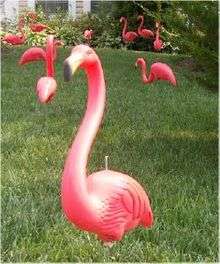Plastic flamingo
 | |
| Artist | Don Featherstone |
|---|---|
| Year | 1957 |
| Type | Sculpture |
Pink plastic flamingos are one of the most famous lawn ornaments in the United States, along with the garden gnome.
History
Union Products
The plastic pink flamingo was designed in 1957 by Don Featherstone while working for Union Products, and has become an icon of pop culture,[1] that won him the Ig Nobel Prize for Art in 1996. It has even spawned a lawn greeting industry where flocks of pink flamingos are installed on a victim's lawn in the dark of night. After the release of John Waters's 1972 movie Pink Flamingos,[2] plastic flamingos came to be the stereotypical example of lawn kitsch.[1]
Many imitation products have found their way onto front lawns and store shelves since then; those "official" pink flamingos made by Union Products from 1987 (the 30th anniversary of the plastic flamingo) until 2001 can be identified by the signature of Don Featherstone located on the rear underside. These official flamingos were sold in pairs, with one standing upright and the other with its head low to the ground, "feeding". Sometime after Featherstone's retirement in 2000, Union Products began producing birds without the signature. In December 2001, the Annals of Improbable Research (bestowers of the Ig Nobel prize) teamed up with the Museum of Bad Art to protest this omission in the form of a boycott.[3] Union Products, of Leominster, Massachusetts, stopped production of pink flamingos on November 1, 2006.
HMC International LLC
However, HMC International LLC, a subsidiary of Faster-Form Corporation, purchased the copyright and plastic molds of Featherstone's original plastic flamingos in 2007. HMC sub-contracted production of the flamingos to Cado Manufacturing, Inc., a blow-molder located in Fitchburg, Massachusetts who specialized in this type of production.[4] In 2010, Cado Manufacturing purchased the copyrights and the entire Union Products product line, including the pink flamingo, from HMC. Cado continues to manufacture the Union Products line, and production of the pink flamingo has increased in recent times.
Other information
In 2009, the city of Madison, Wisconsin Common Council designated the plastic flamingo as the city's official bird.[5]
Some homeowners associations forbid the installation of plastic flamingos and similar lawn ornaments, and will fine offending owners,[6] based on the theory that such decorations lower the neighborhood's real estate values.
See also
References
- 1 2 Collins, Clayton (2006). "Backstory: Extinction of an American icon?". Christian Science Monitor. Retrieved 2008-04-23. Published: November 2, 2006
- ↑ "Is the pink flamingo an endangered species?". MSNBC. 2006. Retrieved 2008-04-23. Published: November 1, 2006. From the Associated Press
- ↑ Alice Shirrell Kaswell, AIR staff (2001-12-21). "Join the Plastic Pink Flamingo Boycott!". Annals of Improbable Research. Retrieved 2011-07-16.
- ↑ "Retro pink flamingos to hatch in New York". MSNBC. 2007. Retrieved 2008-04-23. Published: May 31, 2007. From the Associated Press, on the purchase and re-production of Don Featherstone's original plastic-flamingo design.
- ↑ Rickert, Chris (2009-09-01). "City designates plastic pink flamingo as official city bird". Wisconsin State Journal. Retrieved 2009-09-03.
- ↑ Beato, Greg (2008). "Garden gnome politics: the age-old battle over landscape expression". Cengage. Retrieved July 16, 2012.
- Pescovitz, David (2006). "Pink flamingos, RIP". BoingBoing. Retrieved 2008-04-23. Published: October 19, 2006.
- Kaswell, Alice Shirrel (2001-12-21). "Join the Plastic Pink Flamingo Boycott!". Annals of Improbable Research. Retrieved 2011-07-16. Describes the change in design and calls for boycott.
- Price, Jenny (2006). "In the Pink No More". The New York Times. Retrieved 2008-04-23. Published November 17, 2006 - Reflects on the shutdown of the original plastic-flamingo factory and the flamingo's impact on popular culture.
- Featherstone, Don; Herzing, Tom (1999). The Original Pink Flamingos: Splendor on the Grass. Schiffer Publishing. ISBN 978-0-7643-0963-2.
External links
 Media related to Plastic flamingos at Wikimedia Commons
Media related to Plastic flamingos at Wikimedia Commons- Lawn flamingo fansite
